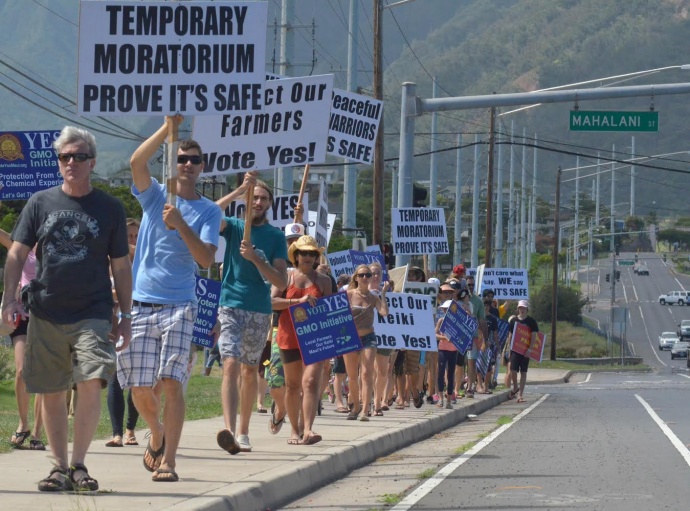GMO Initiative Backers File Lawsuit To Assure Transparency
By Wendy Osher
Five Maui residents filed a lawsuit in Second Circuit court on Wednesday, seeking “declaratory relief to assure transparency and the proper implementation,” of the newly passed initiative that places a moratorium on GMO cultivation in Maui County.
The lawsuit, filed by initiative supporters, Dr. Lorrin Pang, Mark Sheehan, Lei’ohu Ryder, Bonnie Marsh, Alika Atay, and the SHAKA Movement also seeks to “quell the complaints by agricultural giants Monsanto and Dow AgroSciences.”
Honolulu attorney Michael Carroll, who is representing the plaintiffs said the the lawsuit requests that the County take proper measures to implement the new law, including adopting appropriate rules and obtaining the necessary funding.
The lawsuit, he said, further seeks to establish that the law is enforceable by resolving the claims made by Monsanto and Dow AgroSciences to the contrary.
“We applaud the county’s recent indication that they will implement the moratorium,” said Mark Sheehan, spokesperson for the citizen group in a statement from his attorney. “However, given the strong prior opposition of the Maui County Council and Mayor’s Office during the campaign, we want to ensure that the citizens of Maui have full access to the implementation process and that the new law is properly administered.”
On November 4th, Maui voters approved the voter initiative to temporarily suspend the growth, testing, or cultivation of genetically engineered crops in Maui until an environmental and public health study can show that they are safe.
According to initiative supporters, the opposition spent more than $7.97 million on the campaign, in an attempt to defeat the initiative.
“Presently, Hawai`i is used as an outdoor laboratory for companies like Monsanto to test genetically engineered crops and their related pesticide use, a practice that has escaped regulation,” supporters of the initiative said in the statement.
According to information released by the plaintiff’s attorneys, there were 1,124 field sites in Hawaiʻi in 2013 compared to 184 in California.
Initiative supporters claim that testing these crops “means repeated spraying of dangerous chemicals near neighborhoods, schools, and waterways.”
Monsanto executives filed a lawsuit of their own this week saying the “referendum is invalid and contrary to long established state and federal laws that support both the safety and lawful testing and planting of GMO plants.”






_1768613517521.webp)


